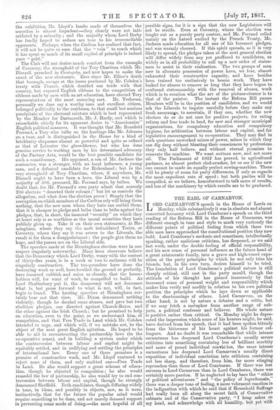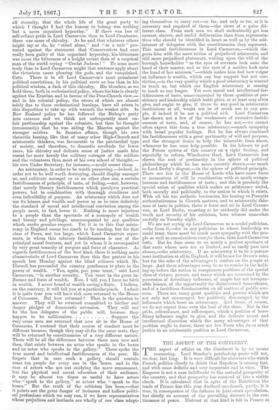THE EARL OF CARNARVON. L ORD CARNARVON'S speech in the House
of Lords on Monday, while substantively it was in absolute and almost concerted harmony with Lord Cranborne's speech on the third reading of the Reform Bill in the House of Commons, was different enough in tone and style to mark very curiously the different points of political feeling from which these two able men have approached the constitutional position they now hold. Lord Cranborne's sardonic and sometimes, intellectually speaking, rather malicious criticism, has deepened, as we said last week, under the double feeling of official responsibility, and his new sense of personal influence as the future head of a great aristocratic family, into a grave and high-toned expo- sition of the party principles by which he not only tries his friends, but, in his own turn, desires himself to be tried. The foundation of Lord Cranborne's political nature is still sharply critical, still cast in the party mould, though the attitude of his thought has gained immensely by that increased sense of personal weight and responsibility which makes him verify and modify in relation to his own political position the principles which he lays down as applicable to the shortcomings of others. Lord Carnarvon, on the other hand, is not by nature a debater and a critic, but if we may fetch a metaphor from another range of sub- jects, a political confessor and believer. His whole nature is positive rather than critical. On Monday night he depre- cated the impression which some of his hearers might, he said, have derived from his speech, that it had been spoken bitterly from the bitterness of his heart against his former col- leagues. And no doubt it was remarkable that while intense earnestness has deepened Lord Cranborne's usually severe criticism into something containing less of brilliant acerbity and more of proud individual convieion, the same intense earnestness has deepened Lord Carnarvon's usually direct exposition of individual conviction into criticism containing not less sharp, and therefore, from him, far more stinging reproaches than those of Lord Cranborne. If there was less sarcasm in Lord Carnarvon than in Lord Cranborne, there was certainly more passion. If he neglected to lay bare the " ethics of political adventurers " and " the policy of legerdemain," there was a deeper tone of feeling, a more vehement emotion in the indignation with which he said that if Household Suffrage had really been all along the secret faith of Conservative cabinets and of the Conservative party, " I heap ashes on my head, and acknowledge with all humility, but yet with
all sincerity, that the whole life of the great party to which I thought I had the honour to belong was nothing but a mere organized hypocrisy." If there was less of self-reliant pride in Lord Carnarvon than in Lord Cranborne, there was more of chivalry. As he said that whatever others might say or do, he " stood alone," and " as a unit " pro- tested against the statement that Conservatives had ever really been guilty of this organized hypocrisy, his.bitterness was more the bitterness of a knight errant than of a sceptical man of the world crying " Credat Judmus I " To none more truly than to Lord Carnarvon might that sentence apply about the victorious cause pleasing the gods, and the vanquished, Cato. There is in all Lord Carnarvon's most prominent political convictions, in his political error no less than in his political wisdom, a dash of this chivalry. His blunders, as we hold them, both in ecclesiastical policy, where his bias is clearly against the Erastian and in favour of the Free-Church view,— and in his colonial policy, the errors of which are almost solely due to these ecclesiastical leanings, have all arisen in this disposition to take up with warmth the weaker side. In New Zealand policy he has followed the Bishop's party into extreme and we think not unfrequently most un- fair partizanship against the colonists, but then he thought (erroneously) that he was aiding the Maories against the stronger settlers. In Jamaica affairs, though his own theoretic leaning, like that of many other High-Church and aristocratic thinkers, was favourable to the patriarchal type of society, and therefore, to domestic servitude for lower races, his chivalry and delicate sense of justice made him resent far more keenly the military outrages of the soldiers and the volunteers than most of his own school of thought,— his own Under Secretary, for instance,—could resent them.
An aristocracy, in order to be worth preserving,—indeed, in order not to be well worth destroying, should display amongst us, and cultivate amongst us as no other class can, a certain fastidiousness of principle, of taste, of feeling,—not, however, that merely literary fastidiousness which paralyzes practical powers, but in combination with thorough steadiness and even inflexibility of purpose. An aristocracy which does not use its leisure and wealth and power so as to raise definitely the standard of moral and intellectual conviction among the people must, in fact, lower it. Nothing is more injurious to a people than the spectacle of a monopoly of wealth and luxury and privilege, unaccompanied by any qualities which excite genuine respect. Yet it is to this that aristo- cracy in England seems too much to be tending, but for that class of Peers, not too large, which Lord Carnarvon repre- sents, in whom this salutary fastidiousness is one of the principal moral features, and yet in whom it is accompanied by very great tenacity of purpose and force of character. As regards fastidiousness of the best kind, there is nothing more characteristic of Lord Carnarvon than this fine protest in his speech last Monday against the blind reliance which Mr. Disraeli has persuaded the country gentlemen to place in the power of wealth. " You, again, put your trust," said Lord Carnarvon, "in another security. You trust in the great in- fluence and force of wealth. Now, I tell you I have no faith in wealth. I never heard of wealth saving a State. I believe, on the contrary, it will fail you at a particular pinch. I admit it is quite true you will have rich men returned to the House of Commons. But how returned ? That is the question to answer. They will be returned committed to further and deeper pledges of democratic extension. They will not be the less delegates of the public will, because they
happen to be millionaires Suppose the very same men are returned that now sit in the House of Commons, I contend that their course of condact must be different because, though they may sit for the same seats, they will be returned by constituencies of a very different nature. There will be all the difference between these men now and then, that exists between an actor who speaks to the boxes and an actor who speaks to the gallery." There spoke the true moral and intellectual fastidiousness of the peer. He forgets that in case such a gallery should contain some ten people for every one in the ''boxes, and in the case of actors who are not studying the mere amusement, but the physical and moral education of their audience, it may be almost ten times as useful to have actors who " speak to the gallery," as actors who " speak to the boxes." But the truth of the criticism lies here,—that it points out the great danger of insincere and hollow politi- cal professions which we may run, if we have representatives whose prejudices and instincts are wholly of one class adapt- ing themselves to carry out—so far, and only so far, as it is necessary and required of them—the views of a quite dif- ferent class. From such men we shall undoubtedly get less earnest, sincere, and useful deliberation than from representa- tives who should be identified in heart as well as by the self- interest of delegates with the constituencies they represent. This moral fastidiousness in Lord Carnarvon,—which dis- gusts him with the mere notion of prejudiced aristocrats, and still more prejudiced plutocrats, waiting upon the will of the borough householder " as the eyes of servants look unto the hand of their master, and as the eyes of a maiden look unto the hand of her mistress,"—which makes him feel how vulgar an influence is wealth, which can buy support but not con- viction,—is the very quality which a good aristocracy is wanted to teach us, but which our English aristocracy is ceasing to teach us any longer. Yet mere moral and intellectual fas- tidiousness of taste, unaccompanied by those qualities of per- sistency and leadership which habit gives, or at least may often give, and ought to give, if there be any good in aristocratic institutions at all, would not be of much use to any peo- ple, if indeed it be not a political evil. Lord Carnarvon has shown not a few of the weaknesses of excessive fastidi- ousness of taste, and, of course, he has not,—we cannot often expect this from a true aristocracy,—much sympathy with broad. popular feelings. But he has always combined his fastidiousness with a great pertinacity of will and purpose, and the strongest desire to help the miserable from above, whenever he has seen help possible. In his labours to put the Prison system of this country on a right footing, and especially to reform Winchester Gaol, Lord Carnarvon has shown the sort of pertinacity in the sphere of political philanthropy which he has more recently shown,—so much to Lord Derby's disgust,—in the sphere of political principle. There are few in the House of Lords who have more force or momentum of will in combination with so much scrupu- lousness and fastidiousness of taste ; and this is precisely the special union of qualities which makes an aristocracy useful, both morally and politically, to the nation in which it exists. With all his too aesthetic tendencies, his leaning to Puseyite authoritativeness in Church matters, and to aristocratic thin- ness of taste in politics, there is force and vis in Lord Carnar- von, as Lord Derby, smarting as he evidently did under the truth and severity of his criticism, bore witness somewhat ruefully on Tuesday night.
We are not crying up Lord Carnarvon as a model politician, —far from it,—for in any politician to whose leadership we could trust, there must be much more sympathy with the peo- ple as well as conscientious care for them, than Lord Carnarvon feels. But he does seem to us nearly a perfect specimen of that caste whose uses are so limited, and so easily pass into abuses,—the aristocracy. If an aristocracy is to be a perma- nent institution at all in England, it will be not for its own sake, but for the sake of the advantages it confers on the people at large. And these advantages seem to us to consist in the hold- ing up before the nation in conspicuous positions of the special class of virtues, powers, and tastes which are nourished by the possession of hereditary influence, of ample but not irrespon- sible leisure, of the opportunity for disinterested benevolence, and of a fastidious discrimination on all matters of public con- cern. There are many great qualities and powers which are not only not encouraged, but positively discouraged, by the influences which beset an aristocracy. And these, of course, we do not expect from even the best of the class. But in the pride, self-reliance, and self-respect, which a position of here- ditary influence ought to give, and the delicate moral and intellectual discretion which the many advantages of that position ought to foster, there are few Peers who do so much justice to an aristocratic position as Lord Carnarvon.































 Previous page
Previous page